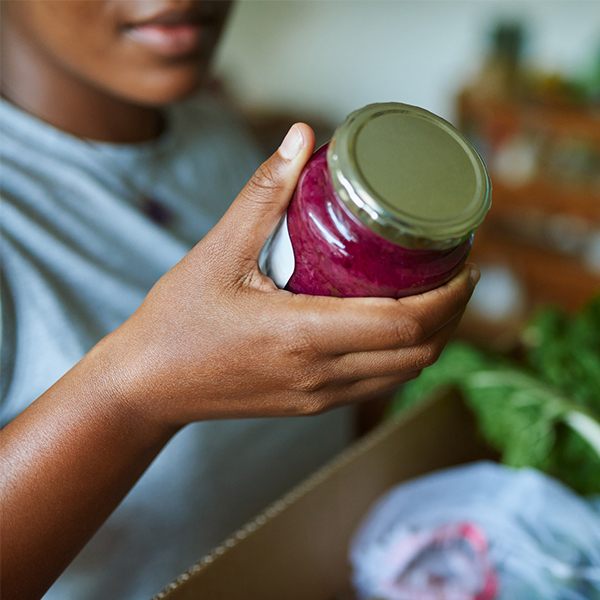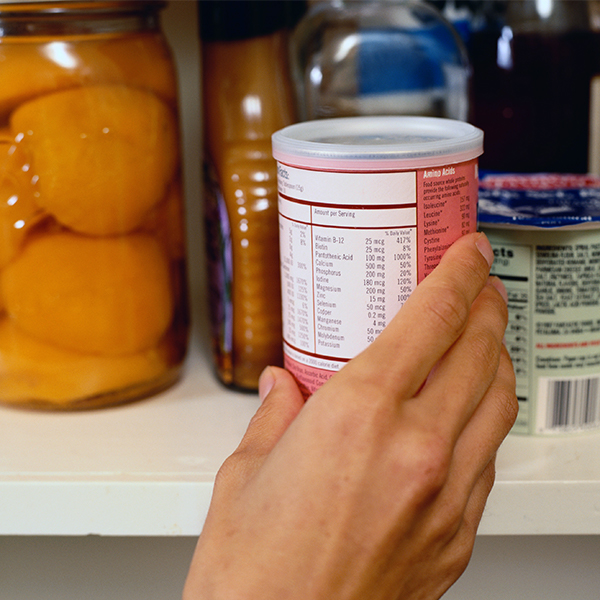
Sarah's story

From reaction to recall: here's how the CFIA took action when one family encountered an undeclared allergen.
Chris Worth opens a box of groceries she purchased online, which was delivered to her home in Windsor, Ontario.
As the mother of a teenager with a severe food allergy, she is careful to check the labels on the food items she received. She pulls out a package of chocolate chips and is dismayed to see a warning on the label: "May contain: Peanuts, Tree nuts, Milk."
She sets the package aside, knowing she will never use the chocolate chips in her baking, as her teenage son could have a life-threatening reaction if the package contains peanuts.
"We have learned from experience to check and double-check and triple-check packaging when food arrives," says Worth. "We need to know that the food we receive is safe and we can't always be sure when we buy it online."
This story might sound familiar to many families in Canada, especially as more people buy groceries online.
What are the health risks?
Across Canada, people are encountering allergy-related health risks with some of the food they buy online. There have been incidents in which information posted online does not provide an accurate or complete picture of the ingredients used in a product.
As a regulator for food safety in Canada, the Canadian Food Inspection Agency (CFIA) recognizes that as e-commerce grows, there is a greater possibility of consumers being exposed to risks of undeclared allergens.
"When a potentially serious food safety hazard such as undeclared allergens is identified through a consumer complaint, the CFIA considers the matter seriously," says Jay Holmes, National Manager, Food Labelling at the CFIA.
"We investigate complaints and may take follow-up actions to protect consumers from health risks, which could include a recall of the food product."
The CFIA is working with other government departments such as Health Canada, and international parties, to better understand current online labelling issues and find possible solutions. The CFIA also works with food companies to promote best practices for food labelling.
The CFIA provides resources on its website to help consumers stay safe from having allergic reactions, including tips for avoiding known allergens in foods and fact sheets on different foods that can cause allergic reactions.
The CFIA also encourages consumers to contact food businesses to ask about allergens of concern if there is insufficient information on the company's website. "If in doubt," says Holmes, "you may wish to consider purchasing a different product or from another seller."
Life-threatening allergic reactions
When Worth's son was a toddler, he had a severe allergic reaction to food containing peanuts and required emergency care.
He was rushed to hospital and had a second wave of anaphylactic symptoms despite the initial symptoms being treated and resolved, and not coming into contact with the allergen again.
"That was our introduction to the world of food allergies," says Worth. Her son recovered and was released from hospital the next day, and has had a couple of mild reaction episodes in the years since.
Millions affected
About 2.3 million Canadians are directly affected by food allergies. Many others are impacted indirectly, as they know someone through school, work or social circles living with food allergies.
"Food allergy affects so many of us, both directly and indirectly, and we should keep this in mind when buying food," says Beatrice Povolo of Food Allergy Canada (opens in new window).
During the COVID-19 pandemic, Food Allergy Canada has received calls and emails from consumers who found inconsistencies with the ingredient information provided online versus what is declared on the label of the actual product.
"This tells us that online purchases require extra vigilance," says Povolo, whose organization supports Canadians living with food allergy and is marking Food Allergy Awareness Month (opens in new window) in May.
She notes that buying food online can be different than shopping at a grocery store, where you can take the package off the shelf and read the ingredient list to see if it is a safe option from a food allergy perspective.
"When you're at the store, there is the added assurance that the item you select from the shelf is the item that ends up in your home. Additional care and attention are necessary when ordering food online or by phone for pick-up or delivery."
Advice for consumers
If you are buying groceries online and need to avoid food allergens, Povolo recommends checking the labels three times.
"When your order arrives, read the ingredient list on all of the food products carefully before you put them away, then again when you prepare the food, and again before you serve it to someone with a known food allergy."
Other food safety practices include sticking with brands you have used previously and not accepting substitutions on orders.
Health Canada provides online information and resources (opens in new window) about common food allergens and the risks and symptoms of food allergies.
The good news is that there are steps consumers can take to stay away from allergens in foods, and it starts with reading the food labels carefully.
"The Canadian labelling requirements are very, very good," says Worth. "Manufacturers print ingredient lists and 'may contain' statements on their packages, so the information is there to help us make informed decisions."
Share your concerns with the CFIA
Holmes says if you have an allergic reaction and the food you ate appears to be mislabelled or does not include a "may contain" statement about the allergen, the CFIA wants to hear about it. You can visit the Agency's website to report a food-related concern.
"Reaching out to the CFIA can help us identify allergen issues and enable us to take appropriate actions that could prevent other consumers from getting sick. It might help save lives."
Learn more
- Before you shop: food allergies and allergen labelling
- What to consider when shopping online for food, plants or animal products
- Riding the e-commerce wave: be aware of risks of some online purchases
- Science in action: protecting people with allergies
- Pass the Mic: talking about celiac disease
- Meet Lacy, a Canada Border Services Agency detector dog
- Importing by mail (opens in new window) (Canada Border Services Agency)
- Online shopping (opens in new window) (Innovation, Science and Economic Development Canada)
Get more Inspect and Protect
- Want to learn more about what we do? Explore articles, videos and podcasts.
- Interested in reporting on a story? Contact CFIA Media Relations to arrange an interview with one of our experts.
- Have an idea or feedback to share? Get in touch!